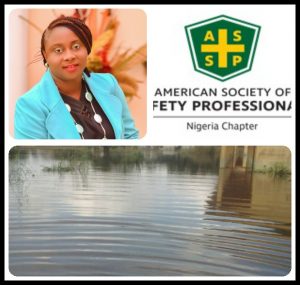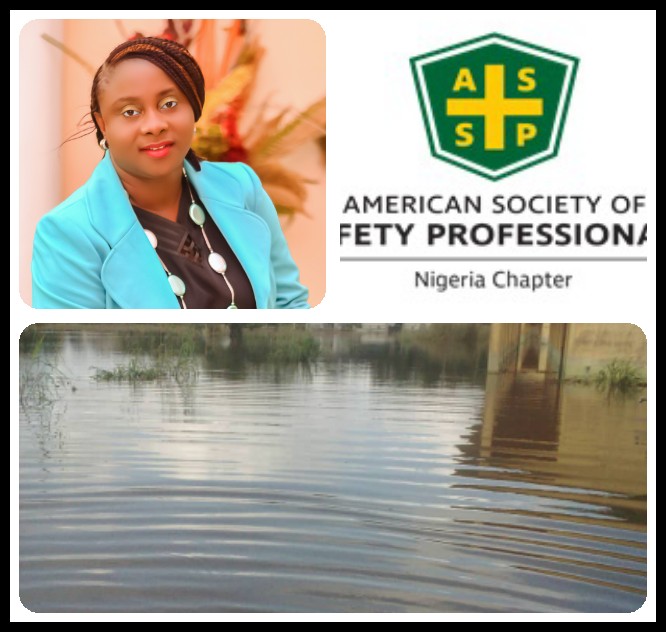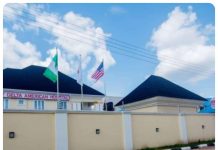 The American Society of Safety Professionals, (ASSP), Nigeria Chapter has decried the devastating effects of flooding in parts of Nigeria that is gradually becoming an environmental pandemic in the country.
The American Society of Safety Professionals, (ASSP), Nigeria Chapter has decried the devastating effects of flooding in parts of Nigeria that is gradually becoming an environmental pandemic in the country.
The ASSP President, Nigeria Chapter, Mrs. Mercy Omoifo-Irefo, said since 2012 flooding that ravaged many communities across the country, which left behind several fatalities and damaged properties, flooding has become a reoccurring event in Nigeria, attributing the sad development to the rising waters from the main channels of River Niger and River Benue that cut across the six geopolitical zones of the country.
Mrs Omoifo-Irefo noted that most coastal communities along Rivers Niger and Benue and adjourning states are annually prone to flooding, stressing “this flooding problem is very devastating, causing huge destruction of rural infrastructure, including roads, bridges, electricity facilities as well as farmlands and crops, among others”.
“The current effects of the rampaging flood across the nation have attracted the attention of ASSP. As an organization committed to ensuring safety of lives and property with an over whelming interest to protecting the environment, we are concerned and must seek solution to it. ASSP shall sustain it efforts at addressing occupational and environmental hazards to reduce risks people are being confronted on daily basis as well as other threats to life”, Omoifo-Irefo stated.
She explained that the impacts of flooding had increased from significant to threatening proportions in Nigeria, saying that the sad narratives has resulted to massive loss of lives and properties.
The ASSP President regretted that the flood had collapsed many buildings, including schools and markets infrastructures, and farmlands submerged by the water, saying some persons are being carried away by the flood leading them to untimely death, while economic activities of major agricultural producing communities are cut-off during this period, resulting to food shortages and high prices of available farm produced.
Omoifo-Irefo emphasized “Several communities are affected by the overflow of River Niger in Kogi state. Thousands of homes, farmlands destroyed in Jigawa, Kano, Kebbi and Sokoto states in northern parts of Nigeria. Buildings and farmlands damaged in Ikorodu, Lagos state, Edo State, Delta State. Virtually the entire Niger Delta region have constantly fallen victim of this natural environmentally disastrous phenomenon because of the inadequate attention being paid by both States and Federal Government to this reoccurring annual event”.
Continuing “The ASSP Nigerian Chapter posited some measures that the Federal Government can embark upon to reduce the environmental and human devastating effects of flooding in Nigeria. This included, introducing better meteorological flood warning systems, enforcing strict adherence to flood resilient architectural profiles especially for residents in flood prone areas, constructing houses and structures above flood reached levels, increased spending by the Federal Government on the construction of dams that can regulate the quantum of water that are released to down line streams in the event of severe rainfalls during flood seasons and restoring rivers to their natural courses by opening up and dredging waterways”, she said.
Mrs Omoifo-Irefo stated that it is the desire of the Nigeria Chapter of ASSP to partner with the Federal Government for valuable and professional advise on proffering dynamic solutions to this seemingly perennial pandemic flooding in Nigeria.
She reiterated that ASSP is a global association of occupational safety and health professionals that focuses on workplace safety standards to reduce avoidable injuries and illnesses which in turn leads to improved productivity with a reduced overhead health costs.
This focus accordingly to Mrs Omoifo-Irefo, has been driven by safety advocacy on known safety standard practices through continuous education on safety.





